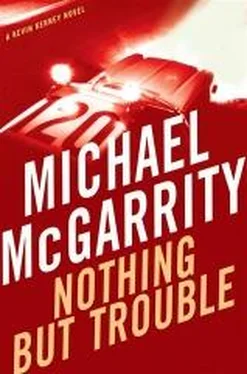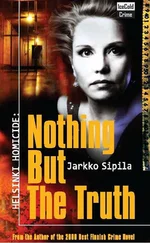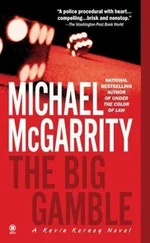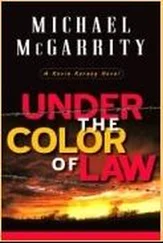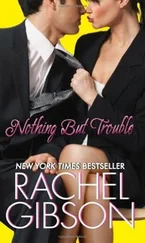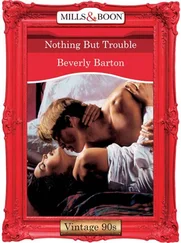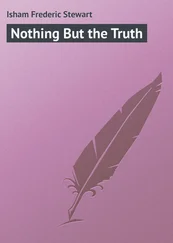Michael McGarrity - Nothing But Trouble
Здесь есть возможность читать онлайн «Michael McGarrity - Nothing But Trouble» весь текст электронной книги совершенно бесплатно (целиком полную версию без сокращений). В некоторых случаях можно слушать аудио, скачать через торрент в формате fb2 и присутствует краткое содержание. Жанр: Триллер, на английском языке. Описание произведения, (предисловие) а так же отзывы посетителей доступны на портале библиотеки ЛибКат.
- Название:Nothing But Trouble
- Автор:
- Жанр:
- Год:неизвестен
- ISBN:нет данных
- Рейтинг книги:4 / 5. Голосов: 1
-
Избранное:Добавить в избранное
- Отзывы:
-
Ваша оценка:
- 80
- 1
- 2
- 3
- 4
- 5
Nothing But Trouble: краткое содержание, описание и аннотация
Предлагаем к чтению аннотацию, описание, краткое содержание или предисловие (зависит от того, что написал сам автор книги «Nothing But Trouble»). Если вы не нашли необходимую информацию о книге — напишите в комментариях, мы постараемся отыскать её.
Nothing But Trouble — читать онлайн бесплатно полную книгу (весь текст) целиком
Ниже представлен текст книги, разбитый по страницам. Система сохранения места последней прочитанной страницы, позволяет с удобством читать онлайн бесплатно книгу «Nothing But Trouble», без необходимости каждый раз заново искать на чём Вы остановились. Поставьте закладку, и сможете в любой момент перейти на страницу, на которой закончили чтение.
Интервал:
Закладка:
“Maybe they still can,” Kerney said.
All eyes turned toward Kerney.
“Who are you?” the tall man asked.
“Kevin Kerney. I’m one of your technical advisors.”
“Kerney’s here for the cop stuff,” Johnny said, looking flustered. “Not rodeoing.”
“Let Chief Kerney talk,” the tall man said, waving Kerney toward an empty chair. “I’m Malcolm Usher, the director.”
Kerney sat at the table and nodded a hello to all before turning his attention to Usher. “It seems to me, you can show off their rodeo talents through some good old-fashioned cowboying. They can rope cows and cops, do some bulldogging and bronc riding, and cut out stock so that it’s a combined rodeo, brawl, and police bust.”
All the people at the table, including Johnny, waited for Usher’s reaction.
Usher slapped the table with his hand and stood. “I love it. It’s exactly what I had in mind.” He patted the man with the glasses on the shoulder. “Get our stunt coordinator started working out the details. I want cows climbing over squad cars, knocking cops over, barreling through buildings, that kind of stuff. I’m thinking it will be a late-afternoon, early-evening shoot, just like we planned for the rodeo scenes. Probably two days. Schedule us to go back to the smelter tomorrow before sundown.”
The man with the eyeglasses wrote down Usher’s instructions on the clipboard. “We’ll have to come to some agreement to lease the premises. But with the smelter shut down, I doubt the cost will be exorbitant.”
“Good,” Usher said as he closed his three-ring binder and looked at Johnny. “Let’s you and I get together before dinner and sketch out the new scenes for the writers.”
Glumly, Johnny nodded.
“That’s it,” Usher said. “Everybody back here at four a.m. for the tech scout. Charlie will give you your housing assignments, and our schedule for the next two days. For now, we’ll all be crashing in the apartment building.”
Usher left. Charlie, who turned out to be the man wearing the eyeglasses, read off the housing assignments, which had Kerney bunking with Johnny. Charlie told the group that meals would be served by the caterer in the mercantile building, and the tech scout locations would be passed out after dinner.
As the meeting broke up, Johnny introduced Kerney to the people in attendance. The group included the unit production manager, set decorator, transportation captain, construction coordinator, cinematographer, the assistant director, several other lighting specialists, and Charlie Zwick, the producer.
Zwick shook Kerney’s hand and thanked him for his good idea.
“Yeah, thanks a lot,” Johnny said sarcastically, after Zwick left the building.
“Come on, Johnny,” Kerney said. “It was apparent that the director had already made up his mind to change the ending before I spoke up.”
“You don’t get it,” Johnny snapped. “I’m trying to build public interest in rodeoing with this movie. Get people excited about the sport, make it a major ticket draw. Now that’s not going to happen. Instead, film-goers are just gonna see what they think are a bunch of neat horseback and cowboy stunts as part of a brawl.”
Kerney pushed open the door and stepped outside. “I wasn’t trying to thwart you.”
Johnny took the cell phone off his belt and flipped it open. “It sure felt that way. I’ve got some phone calls to make. I’ll see you later.” Johnny hurried across the parking lot with the cell phone planted in his ear.
Kerney decided to let Johnny chill out before going to the apartment. He didn’t want to face a contentious evening with Johnny ragging on him about not getting his way. It was a good two hours before dinner. He decided to drive to the smelter to take a look at the place that had inspired Malcolm Usher to change the script. Besides, he wanted to see the Star of the North that Officer Sapian had told him about.
The paved road from Playas to the copper smelter paralleled a railroad spur that connected with the main trunk line east of Lordsburg, a windblown desert town on Interstate 10 that served as the seat of government for Hidalgo County.
The valley widened a bit as Kerney headed south, deep into the Bootheel. To the west the Animas Mountains cut a broad, foreboding swath against the sky. To the east the Little Hatchet Mountains, drenched in afternoon sunlight, were buff gold at the peaks.
Farther southeast the Big Hatchet Mountains rose up, pointing the way to Mexico and the Alamo Hueco Mountains at the border, where, according to what Kerney had read, once a year in the spring buffalo came up from the Chihuahua Desert to forage. He thought it would be great to see that.
Under the greasewood and mesquite the tall valley grass was a thick pelt that signaled summer rains had arrived at exactly the right time. Otherwise the grass would be yellow and stunted, the sandy soil dried out and cracked.
The big sky, the mountains, the desert so deceptively serene, the scarcity of anything man-made in the valley, pleased Kerney and gave him hope that maybe ranching could hold on and survive for a few more generations.
Nine miles south of Playas all those thoughts passed from Kerney’s mind. The smelter sat on the east side of the valley between two dry lakebeds with the Little Hatchets looming over the complex, dwarfing the towering smokestack. The gate was open, and Kerney parked in front of the administration building, where a sign directed him to a side entrance.
Inside, he found fully equipped offices, conference rooms, and a reception area devoid of people except for a lanky, middle-aged man dressed in a Western shirt, jeans, and boots, who was filling out paperwork at a counter in front of an enlarged, framed photograph of the smelter.
“Can I help you?” the man said.
“I’m with the film company,” Kerney told him, extending his hand. “Name’s Kevin Kerney.”
“Ira Dobson,” the man replied, shaking Kerney’s hand. “I had a whole slew of you movie folks through here a couple hours ago.”
“I missed the tour,” Kerney replied.
“You didn’t miss much,” Dobson replied with a laugh. “About all I showed them was where we used to unload the copper concentrate, the building that houses the flash furnace, and the acid plant.”
“Acid plant?” Kerney asked.
Dobson nodded. “Yep. We used to produce more sulfuric acid than copper. Time was, we shipped twenty-five tank cars of acid and up to forty semitruck loads a day. Most of it went to make fertilizer.”
“Where did you get the water to run the acid operation?” Kerney asked.
Dobson studied Kerney more carefully. “Sounds like you know something about the process.”
Kerney shook his head. “Not really. But I do know it takes water to make sulfuric acid.”
“Lots of water,” Dobson agreed. “We used two hundred fifty thousand gallons a day when the plant was running, just on acid production alone. At peak capacity our wells can produce four million gallons a day.”
“That’s a hell of a lot of water to pump out of the ground.”
Dobson nodded. “The company owns or controls almost a half-million acres of land in the Bootheel, plus about seven thousand acre-feet of annual water rights. The day could come when the water may be worth more than the land.”
“Do you run the show here?” Kerney asked.
Dobson chuckled. “Nope, I run the water system for the smelter and the town site. We’ve got wells spread up and down the valley. Some are used by ranchers who lease grazing rights from the company, some are for wildlife habitat. In the more remote areas we use solar power to pump the wells.”
“The job must keep you jumping,” Kerney said.
Dobson snorted. “At least I’ve got a job, for now. But once they tear this smelter down, I’ll be looking for work.”
Читать дальшеИнтервал:
Закладка:
Похожие книги на «Nothing But Trouble»
Представляем Вашему вниманию похожие книги на «Nothing But Trouble» списком для выбора. Мы отобрали схожую по названию и смыслу литературу в надежде предоставить читателям больше вариантов отыскать новые, интересные, ещё непрочитанные произведения.
Обсуждение, отзывы о книге «Nothing But Trouble» и просто собственные мнения читателей. Оставьте ваши комментарии, напишите, что Вы думаете о произведении, его смысле или главных героях. Укажите что конкретно понравилось, а что нет, и почему Вы так считаете.
